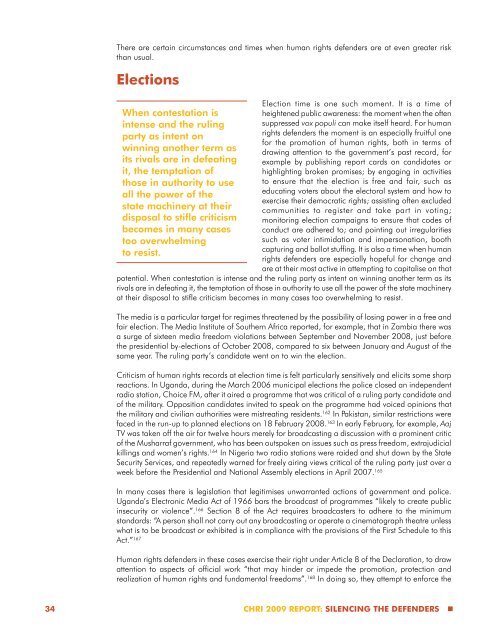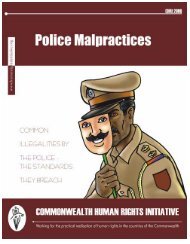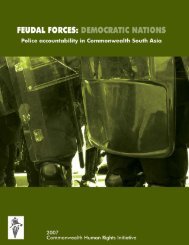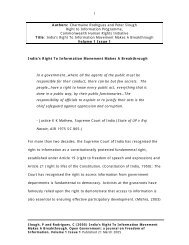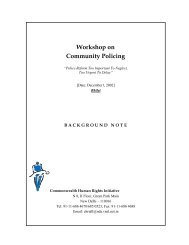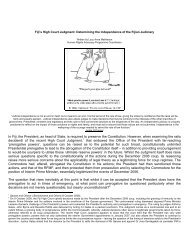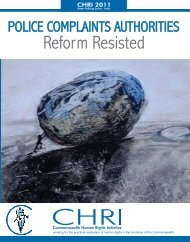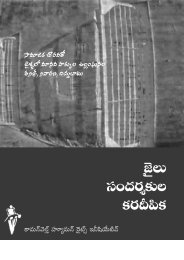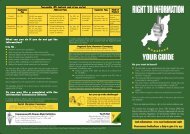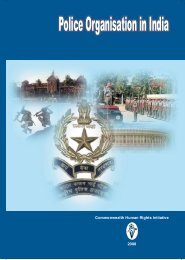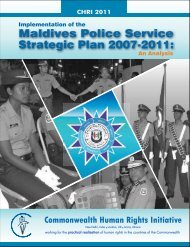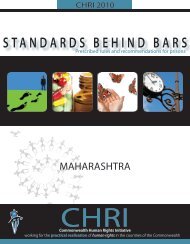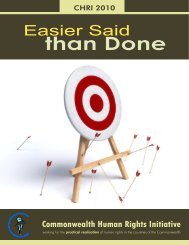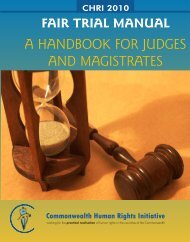Silencing the Defenders - Commonwealth Human Rights Initiative
Silencing the Defenders - Commonwealth Human Rights Initiative
Silencing the Defenders - Commonwealth Human Rights Initiative
You also want an ePaper? Increase the reach of your titles
YUMPU automatically turns print PDFs into web optimized ePapers that Google loves.
There are certain circumstances and times when human rights defenders are at even greater risk<br />
than usual.<br />
Elections<br />
When contestation is<br />
intense and <strong>the</strong> ruling<br />
party as intent on<br />
winning ano<strong>the</strong>r term as<br />
its rivals are in defeating<br />
it, <strong>the</strong> temptation of<br />
those in authority to use<br />
all <strong>the</strong> power of <strong>the</strong><br />
state machinery at <strong>the</strong>ir<br />
disposal to stifle criticism<br />
becomes in many cases<br />
too overwhelming<br />
to resist.<br />
Election time is one such moment. It is a time of<br />
heightened public awareness: <strong>the</strong> moment when <strong>the</strong> often<br />
suppressed vox populi can make itself heard. For human<br />
rights defenders <strong>the</strong> moment is an especially fruitful one<br />
for <strong>the</strong> promotion of human rights, both in terms of<br />
drawing attention to <strong>the</strong> government’s past record, for<br />
example by publishing report cards on candidates or<br />
highlighting broken promises; by engaging in activities<br />
to ensure that <strong>the</strong> election is free and fair, such as<br />
educating voters about <strong>the</strong> electoral system and how to<br />
exercise <strong>the</strong>ir democratic rights; assisting often excluded<br />
communities to register and take part in voting;<br />
monitoring election campaigns to ensure that codes of<br />
conduct are adhered to; and pointing out irregularities<br />
such as voter intimidation and impersonation, booth<br />
capturing and ballot stuffing. It is also a time when human<br />
rights defenders are especially hopeful for change and<br />
are at <strong>the</strong>ir most active in attempting to capitalise on that<br />
potential. When contestation is intense and <strong>the</strong> ruling party as intent on winning ano<strong>the</strong>r term as its<br />
rivals are in defeating it, <strong>the</strong> temptation of those in authority to use all <strong>the</strong> power of <strong>the</strong> state machinery<br />
at <strong>the</strong>ir disposal to stifle criticism becomes in many cases too overwhelming to resist.<br />
The media is a particular target for regimes threatened by <strong>the</strong> possibility of losing power in a free and<br />
fair election. The Media Institute of Sou<strong>the</strong>rn Africa reported, for example, that in Zambia <strong>the</strong>re was<br />
a surge of sixteen media freedom violations between September and November 2008, just before<br />
<strong>the</strong> presidential by-elections of October 2008, compared to six between January and August of <strong>the</strong><br />
same year. The ruling party’s candidate went on to win <strong>the</strong> election.<br />
Criticism of human rights records at election time is felt particularly sensitively and elicits some sharp<br />
reactions. In Uganda, during <strong>the</strong> March 2006 municipal elections <strong>the</strong> police closed an independent<br />
radio station, Choice FM, after it aired a programme that was critical of a ruling party candidate and<br />
of <strong>the</strong> military. Opposition candidates invited to speak on <strong>the</strong> programme had voiced opinions that<br />
<strong>the</strong> military and civilian authorities were mistreating residents. 162 In Pakistan, similar restrictions were<br />
faced in <strong>the</strong> run-up to planned elections on 18 February 2008. 163 In early February, for example, Aaj<br />
TV was taken off <strong>the</strong> air for twelve hours merely for broadcasting a discussion with a prominent critic<br />
of <strong>the</strong> Musharraf government, who has been outspoken on issues such as press freedom, extrajudicial<br />
killings and women’s rights. 164 In Nigeria two radio stations were raided and shut down by <strong>the</strong> State<br />
Security Services, and repeatedly warned for freely airing views critical of <strong>the</strong> ruling party just over a<br />
week before <strong>the</strong> Presidential and National Assembly elections in April 2007. 165<br />
In many cases <strong>the</strong>re is legislation that legitimises unwarranted actions of government and police.<br />
Uganda’s Electronic Media Act of 1966 bars <strong>the</strong> broadcast of programmes “likely to create public<br />
insecurity or violence”. 166 Section 8 of <strong>the</strong> Act requires broadcasters to adhere to <strong>the</strong> minimum<br />
standards: “A person shall not carry out any broadcasting or operate a cinematograph <strong>the</strong>atre unless<br />
what is to be broadcast or exhibited is in compliance with <strong>the</strong> provisions of <strong>the</strong> First Schedule to this<br />
Act.” 167<br />
<strong>Human</strong> rights defenders in <strong>the</strong>se cases exercise <strong>the</strong>ir right under Article 8 of <strong>the</strong> Declaration, to draw<br />
attention to aspects of official work “that may hinder or impede <strong>the</strong> promotion, protection and<br />
realization of human rights and fundamental freedoms”. 168 In doing so, <strong>the</strong>y attempt to enforce <strong>the</strong><br />
34 CHRI 2009 REPORT: SILENCING THE DEFENDERS •


